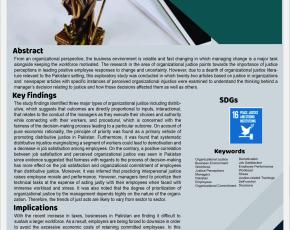Abstract
From an organizational perspective, the business environment is volatile and fast changing in which managing change is a major task alongside keeping the workforce motivated. The research in the area of organizational justice points towards the importance of justice perceptions in leading positive employee responses to change and uncertainty. However, due to a dearth of organizational justice literature relevant to the Pakistani setting, this exploratory study was conducted in which twenty-two articles based on justice in organizations and newspaper articles with specific instances of perceived organizational injustice were examined to understand the thinking behind a manager’s decision relating to justice and how those decisions affected them as well as others.
Key findings
The study findings identified three major types of organizational justice including distributive, which suggests that outcomes are directly proportional to inputs, interactional, that relates to the conduct of the managers as they execute their choices and authority while connecting with their workers, and procedural, which is concerned with the fairness of the decision-making process leading to a particular outcome. On account of pure economic rationality, the principle of priority was found as a primary vehicle of promoting distributive justice in Pakistan. Furthermore, it was found that systematic distributive injustice marginalizing a segment of workers could lead to demotivation and a decrease in job satisfaction among employees. On the contrary, a positive correlation between job satisfaction and perceived organizational justice was seen in Pakistan since evidence suggested that fairness with regards to the process of decision-making has more effect on the job satisfaction and organizational commitment of employees than distributive justice. Moreover, it was inferred that practicing interpersonal justice raises employee morale and performance. However, managers tend to prioritize their technical tasks at the expense of acting justly with their employees when faced with immense workload and stress. It was also noted that the degree of prioritization of organizational justice by the management depends highly on the nature of the organization. Therefore, the trends of just acts are likely to vary from sector to sector.
Implications
With the recent increase in taxes, businesses in Pakistan are finding it difficult to sustain a larger workforce. As a result, employers are being forced to downsize in order to avoid the excessive economic costs of retaining committed employees. In this situation, it will be helpful for managers to opt for greater measures of procedural justice. Involving employees in the decision-making process, at least to some degree, can cushion the impact of delivering bad news. Similarly, justice-related goals should be woven into annual development leadership programs rather than only providing justice-related trainings in organizations. Additionally, self-control assessment tests should be incorporated in the hiring and promotional procedures to help deliver just leaders. Furthermore, this research can be helpful for a multitude of disciplines including experimental, legal and a wide variety of organizational settings in understanding how people express their emotions, how they view themselves, and how willing they are to back certain choices.













